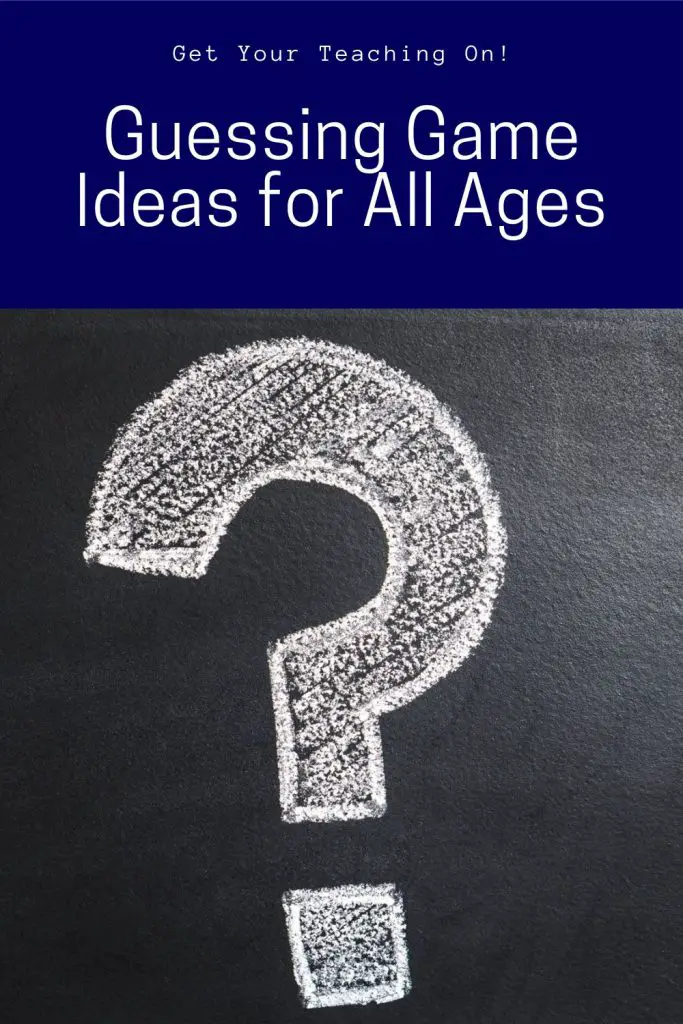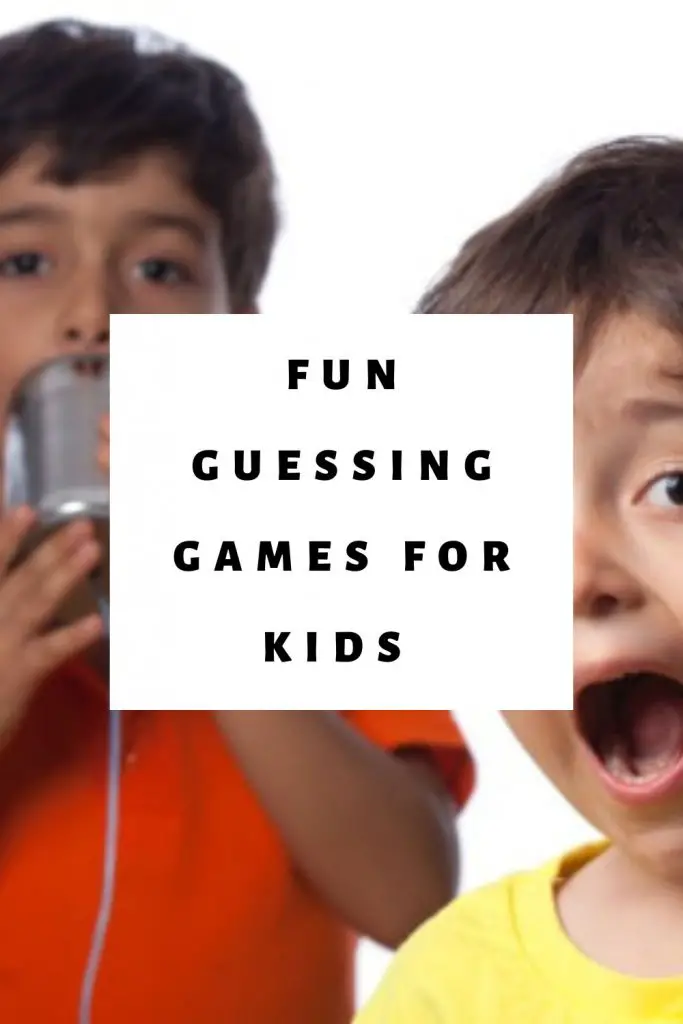If you’re looking for some of the best guessing games, then you’re certainly in the right place! Check out these guess game ideas for all ages, including kids, teenagers and adults.

Fun guessing games to play
Guessing Games Ideas
Let’s get into all the fun guessing games that you might want to try out! Keep on reading.
#1: Mystery Box Guessing Game for Kids
This is one of my favourite guessing games for kids. Put a bunch of objects into a bag or box and students have to reach their hands it and try to guess what something is before pulling it out. It’s ideal for focusing on things like letters, adjectives, classroom objects, etc. Check it out here:
#2: Animal Vocabulary Guessing Game
#3: Password Guessing Game
This is a fun guessing game for all ages! Write down a bunch of words that you want to review on large pieces of paper. Students take turns describing it to one of their teammates who has to guess what it is. Have a look here:
#4: The Memory Circle
Challenge students’ memories with this memory game. It can be used for names or things like the simple past. Basically, students have to add a sentence to the game and then all the further players have to say everything that was previously said and add their own statement.
Does that make sense? Not to worry if it doesn’t! Just have a look here for more details:
#5: The Flyswatter Game
Try out this fun game for kids! Write down a bunch of words that you want to review on the board. Then, a student from each team comes up to the board and picks up a flyswatter. The teacher gives hints and the first student to guess the correct word gets a point for their team. Erase that word and replace it with a new one.
Sounds fun? It definitely is and students love this one. Learn more about it:
#6: General Knowledge Guessing Game Online
#7: Concentration Guessing Game
This is a fun guessing game to play for all ages. It’s ideal for reviewing just about anything. Make up sets of cards (word-definition, word-picture, etc.) and then in small groups, students have to play a memory game. The key is that students place the cards back in the same spot so it’s not a random luck kind of thing. Find out all the details:
#8: Word Challenge Spelling Game
This is a fun game that helps students with their spelling skills. Everyone can stand up and the teacher says a word. Students take turns adding a letter, one by one. If someone gets a letter wrong, they sit down and are out of the game. Check it out here:
#9: Guess the Word (with Flashcards)
When I teach kids, I almost never set foot in the classroom without a set of flashcards. There are a ton of things you can do with them, including as simple as “guess the word.”
You can also get students to ask you questions. For example, if you’re teaching about animals, students can ask, “Is it a tiger?” The teacher can answers yes or no. The teacher could also give some hints about it such as the colour.
Have a look here for even more ideas:
Flashcards Activities and Games.
#10: Odd One Out, a Fun Guessing Game
#11: Running Dictation
This is a challenging game for slightly older and higher-level students. Basically, students have to work together to dictate a conversation. Then, when that’s done, they have to put it into the correct order to make a coherent conversation.
It’s a nice activity for getting some energy back into the classroom. Find out more about it:
#12: Pictionary Guessing Game
I love to play Pictionary with my students! It’s a nice way to review key vocabulary from previous lessons. Students have to draw a picture, based on the slip of paper that the teacher gives them and the other students have to guess what it is.
#13: Find Someone Who Bingo
This is a fun game that involves students talking to their classmates to try to find a person who fits a certain square. For example, has a brother or plays soccer. Check it out:
#14: Country Guessing Game
#15: Closest in Meaning
Try out this challenging guessing game with your students. There’s a target sentence and then 2 or 3 other sentences that are similar. Students have to choose the one which is the closest in meaning. Have a look here:
#16: Charades
This is another classic guessing game. Students have to act out a word or phrase, based on the slip of paper that the teacher gives them. Their teammates have to guess what it is.
#17: Riddles for Kids
#18: Mixed Up Sentences
This is a simple way to help students with making grammatically correct sentences. Write some sentences that have the word order mixed up. Then, students have to unscramble them. Learn more about it:
#19: What’s in the Picture?
Show students a picture or display it on a screen for a limited time. Students observe the picture and then discuss in pairs or small groups what they saw, describing the people, objects, and actions they noticed. After the discussion, students write or share their descriptions, and the class compares them with the original picture to see how accurate they were.
#20: J0bs and Occupation Guessing Game
#21: Disappearing Text
Try out this fun guessing game for all ages. Write a sentence on the board and students have to read it out loud, together. Then, erase some of the words and students have to say the entire thing again. Eventually, there will be nothing left but students have to remember what it was.
It’s ideal for reinforcing sentence structure or vocabulary. Check it out:
#22: I Spy
This is a fun guessing game idea for kids. I’m sure you’ve played it before. The teacher can say, “I spy, with my little eye something that is green.” Students have to take turns guessing what it is. The person who guesses the correct thing can go next.
#23: 20 Questions
I’m sure you’ve also played 20 questions before! Someone chooses a secret noun (person, place or thing), and then the rest of the people have to ask yes/no questions to try to figure out what it is. My rule is that a guess also counts as a question in order to prevent random guessing which makes this game not that fun.
It’s easy to adapt 20 questions for the level by restricting the object chosen. For example, animals. But I might also make it into the “10 questions game” if I do that.
#24: Prepositions of Place Guessing Game
#25: What Am I?
In this game, students go in groups and choose something. I generally restrict it to a category. Jobs, food, and animals all work well. Then, students have to write 3 hints, starting with the most general. For example:
- This person has to go to university.
- You can find this person in a hospital.
- This person gives medicines and has to deal with needles
The answer? A nurse.
#26: How Many Candies Guessing Game
This is a fun guessing game for all ages that I like to do around the holidays. I get some holiday-themed candies and place them in a jar, counting them as I go and I seal it up. Then, everyone gets one guess as to how many there are. The person closest gets to keep them!
#27: Flip Chart Vocabulary Review
#28: Guess the Number
Someone picks a number. The other people say a number and that person says whether or not it’s higher or lower. Eventually, they can get the original number. The challenge is to do it in the fewest possible guesses.
#29: Backward Charades
Divide the class into teams. Instead of one person acting out a word or phrase, the entire team selects a card and silently acts out the word together. The opposing team has to guess the word within a time limit. This game promotes teamwork and creativity.
#30: Taboo
Prepare a list of target vocabulary words or phrases. One student selects a word and has to describe it without using the word itself or a list of taboo words associated with it. The other students try to guess the word based on the description. This game challenges students’ descriptive abilities and expands their vocabulary.

Fun guessing games
Guessing Games Online
Want to have some fun with online guessing games? Have a look at our recommendations:
Trivia and Riddles
- Amazon Kindle Edition
- Bolen, Jackie (Author)
- English (Publication Language)
- 62 Pages - 01/13/2016 (Publication Date)
Do you know some kids who want to have some fun with riddles and trivia? Then you’ll definitely want to pick up this handy resource. It’s ideal for teachers!
You can easily find this book on Amazon. Have a look now:
Guess Games FAQs
There are a number of common questions that people have about guessing games. Here are the answers to some of the most popular ones.
What’s a fun guessing game?
A fun guessing game that you might already know is 20 questions. Some other good ones are charades and Pictionary.
What is the game where you guess places?
The game where you guess places is called GeoGuessr. It started as a web app and the challenge is to guess the location based on random street-view pictures.
What is the number guessing game?
The number guessing game is played when someone thinks of a random number. The other people guess a number and the person says whether it’s higher or lower. Eventually, the correct number can be found.
What skills do ESL guessing games help develop?
ESL guessing games help develop skills such as listening comprehension, speaking, vocabulary recall, descriptive abilities, deductive reasoning, and cultural understanding.
Can guessing games be adapted for different proficiency levels?
Yes, guessing games can be adapted for different proficiency levels by adjusting the complexity of vocabulary or clues used in the game.
How can I incorporate guessing games into my ESL lessons?
You can incorporate guessing games by introducing them as warm-up activities, vocabulary reviews, or interactive practice exercises. They can be used as standalone activities or integrated into various language learning topics.
Are there specific guessing games for practicing grammar or specific language structures?
Yes, certain guessing games can be tailored to practice specific grammar structures or language concepts. For example, playing “Guess the Verb Tense” or “Guess the Preposition” can reinforce grammar knowledge.
Can students create their own guessing games?
Absolutely! Encouraging students to create their own guessing games fosters creativity, critical thinking, and language production. It also gives them a chance to personalize the activity to their interests.
How can I make guessing games more challenging?
To make guessing games more challenging, you can introduce time limits, increase the complexity of clues or descriptions, use synonyms or antonyms as clues, or incorporate higher-level vocabulary.
Can guessing games be played in pairs or small groups?
Many guessing games work well in pairs or small groups. This allows for collaboration, discussion, and peer interaction while playing the game.

Fun guessing games for kids
Guessing Games: Join the Conversation
Do you have any fun ideas for guessing games? Leave a comment below and let us know what you think. We’d love to hear from you.
Last update on 2022-07-17 / Affiliate links / Images from Amazon Product Advertising API






